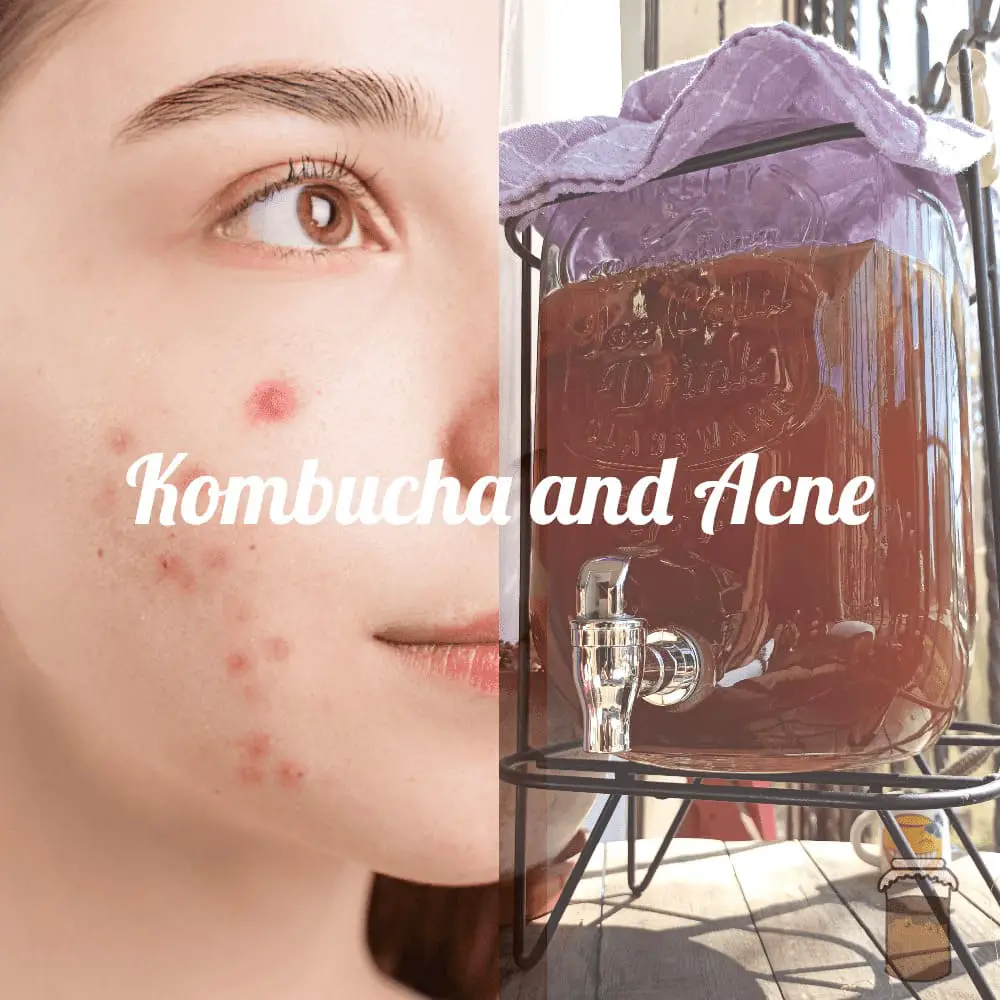
Currently, the appearance of acne is related to different causes. One of the most mentioned is the diet and alterations of the natural microbiome of the skin and the intestine. Is it curious right? How can gut microbes and diet be related? What’s more interesting, what does kombucha have to do with all this?
Acne is multifactorial and generally arises from increased sebum production, the release of inflammatory mediators from the skin, hyperkeratosis, and colonization by anaerobic Propionibacterium acnes (corynebacteria), in addition to other factors of the individual such as genetic, hormonal, environmental and even psychological.
You may be surprised that kombucha may cover several of these characteristics in favor of skin health because it has beneficial components for preventing and treating acne.
It is possible that diet may play a role in the pathogenesis of acne and that some products may affect the course of this inflammatory dermatosis, such as the anti-inflammatory effect of kombucha, which could decrease dermal injury.
While there are few studies, tests with oral probiotics show promising results in controlling acne. Some of those offered by kombucha could generate this effect on dermal health. Still, we are waiting for scientific answers yet.
How can kombucha help cure acne?
It has been shown that acne-causing processes such as follicular hyperkeratinization, excessive sebum production, Propiobacterium acnes, and inflammation are related to the disruption of the skin’s natural barrier, which leads to dryness and irritation of this, so restoring the barrier, moisturizing the skin and reducing inflammation are vital aspects to eliminate acne. [1]
Kombucha offers a variety of nutrients and microorganisms that would cover these needs to avoid damage to dermal tissues, especially with the direct elimination of P. acnes, based on the antimicrobial property of kombucha, but also the competition between probiotics and bacteria.
It has been shown that there is a relationship between the intestine, brain, and skin in the formation of acne, where the use of oral probiotics exert their effect through the reduction of systemic inflammation, mainly the one originated around the dermal follicle, which seems to be predisposed in the appearance of acne, being useful as a possible preventive. [1][2]
Now let’s delve deeper into the benefits that could bring specific components against acne.
What benefits can probiotics give against acne?
Kombucha can contain an immense variety of microorganisms. Some of these can cure acne, given the production of certain substances necessary to promote skin and body health. Some of these benefits are:
- The topical application of probiotics modifies the skin barrier’s function with a secondary increase in its antimicrobial properties, improving the clinic of the disease.
- Also, using Streptococcus thermophiles can increase the production of ceramides that trap moisture in the skin and have direct antimicrobial activity against P. acnes. The immunomodulatory capacity of probiotics on keratinocytes and epithelial cells makes them effective as an adjuvant/support treatment during the application of acne therapy.
- Strains such as Lactococcus sp have antimicrobial activity and inhibit the growth of P. acnes and other microorganisms predisposing to the disease, such as Staphylococcus epidermidis, Staphylococcus aureus, and Streptococcus pyogenes through the secretion of bacteriocins.
- Some probiotics can decrease the presence of IGF-1, which is vital in the pathogenesis of acne.
In laboratories, it was shown that human skin treated with L. paracasei inhibits skin inflammation induced by substance-P, which amplifies the inflammatory cascade and sebum production, considering its therapeutic application in treating acne.
Lactobacillus plantarum in amounts greater than 5% was associated with a reduction in the quantity, size, and erythema associated with acne. [2][3]
Does mood have anything to do with acne?
It is believed that the development of acne may also be due to the relationship between the gastrointestinal tract and the emotions of stress where the gut microbiota is affected. This suggests that kombucha can improve skin health by keeping the intestinal flora stable by providing beneficial bacteria that enhance the bioavailability of neurotransmitters such as serotonin. [4]
Depression and anxiety can alter the gut microbiota and increase permeability, subsequently causing skin inflammation. Apparently, some researchers found a connection between diet, probiotics, and intestinal microorganisms, considering the presence of a gut-brain-skin axis related to the severity of this pathology. [5]
Serotonin has been found in products derived from the fermentation of yeasts. In addition, this neurotransmitter is produced mainly in the gastrointestinal tract. An increase in serotonin creates a greater sense of well-being, thus reducing the emotional and psychic discomfort of the person. [6]
What nutrients have any effect on acne?
First, let’s talk a little about sugar, specifically how kombucha sugar is not a problem for acne.
A diet with high sugar content plays a fundamental role in the pathogenesis of acne, where through several mechanisms, sebum production increases and the appearance of Insulin-like Growth Factor Type 1 (IGF-1).
IGF-1 initiates various compensatory metabolic reactions that have a side effect on the formation of pimples on the skin. Therefore, a diet low in fat and sugars (except for milk) could reduce acne. Here kombucha can be an excellent dietary alternative as kombucha can be very low in sugar.
In addition, kombucha provides vitamin C, some fatty acids, and zinc, which show beneficial effects against acne. It has been proven that the last two help reduce the production of proinflammatory cytokines. Zinc is the most important as it is essential for the development and functioning of human skin, in addition to presenting a bacteriostatic effect against P. Acnes. [1][7]
Can antioxidants fight acne?
The association between diet and acne is increasingly evident. Reactive oxygen species have been found to participate in the inflammatory progression of acne. Therefore it is suggested that oxidative stress may be involved in its origin and that foods with high antioxidant content could support the treatment of acne. [8][9]
In several studies, acne has been found in individuals with low consumption of antioxidants and also saw a decrease of the mineral selenium, necessary for the functioning of the enzyme glutathione peroxidase. Therefore, selenium supplementation results in a possible therapeutic remedy against acne.
Vitamin E also shows an improvement in skin health concerning acne. In recent experiments, researchers found that green tea catechins inhibit sebum production.
Although studies demonstrate these benefits, it has yet to be proven while the condition is present in the individual.
The cause and pathogenesis of acne is not entirely clear. Still, it has been observed that affected patients show increased cutaneous and systemic oxidative stress, particularly lipid peroxidation, so the use of foods with a good amount of antioxidants has been considered to prevent the appearance of acne and prevent the proliferation of this when the pathology is present.
We have reached the end of the article, illustrating that kombucha potentially helps with acne. However, much more scientific evidence is required. Until then, we have all these contents to help you with the information.
References
[1] https://www.ncbi.nlm.nih.gov/pmc/articles/pmc4884775/
[2] https://www.ncbi.nlm.nih.gov/pmc/articles/pmc5418745/
[3] https://pubmed.ncbi.nlm.nih.gov/23886975/
[4] https://pubmed.ncbi.nlm.nih.gov/31284694/
[5] https://www.ncbi.nlm.nih.gov/pmc/articles/pmc5319175/
[6] https://www.mdpi.com/2311-5637/5/2/46/htm
[7] https://pubmed.ncbi.nlm.nih.gov/32327794/
[8] https://www.sciencedirect.com/science/article/abs/pii/S0190962209009670
[9] https://pdfs.semanticscholar.org/b95b/511060d3716fab8fe80695eae4e8e9bdd7fd.pdf
